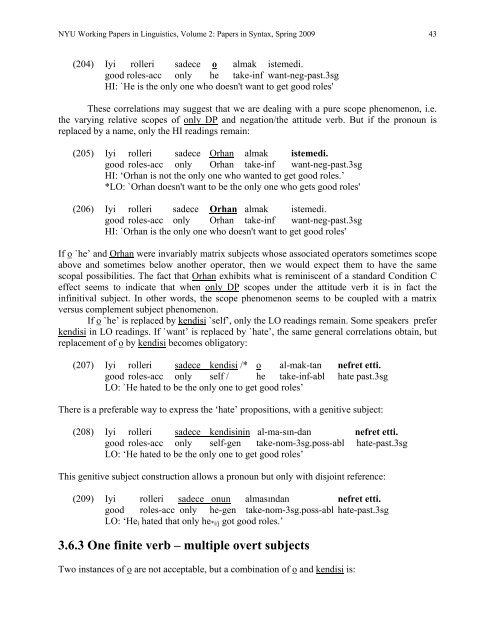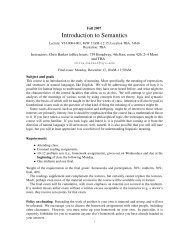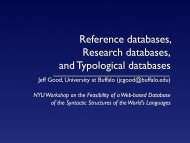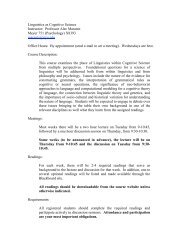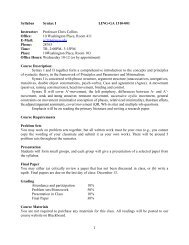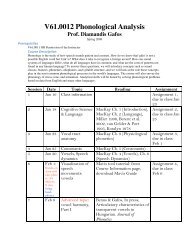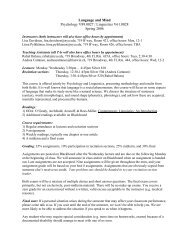Overt Nominative Subjects in Infinitival Complements Cross - NYU ...
Overt Nominative Subjects in Infinitival Complements Cross - NYU ...
Overt Nominative Subjects in Infinitival Complements Cross - NYU ...
You also want an ePaper? Increase the reach of your titles
YUMPU automatically turns print PDFs into web optimized ePapers that Google loves.
<strong>NYU</strong> Work<strong>in</strong>g Papers <strong>in</strong> L<strong>in</strong>guistics, Volume 2: Papers <strong>in</strong> Syntax, Spr<strong>in</strong>g 2009 43(204) Iyi rolleri sadece o almak istemedi.good roles-acc only he take-<strong>in</strong>f want-neg-past.3sgHI: `He is the only one who doesn't want to get good roles'These correlations may suggest that we are deal<strong>in</strong>g with a pure scope phenomenon, i.e.the vary<strong>in</strong>g relative scopes of only DP and negation/the attitude verb. But if the pronoun isreplaced by a name, only the HI read<strong>in</strong>gs rema<strong>in</strong>:(205) Iyi rolleri sadece Orhan almak istemedi.good roles-acc only Orhan take-<strong>in</strong>f want-neg-past.3sgHI: ‘Orhan is not the only one who wanted to get good roles.’*LO: `Orhan doesn't want to be the only one who gets good roles'(206) Iyi rolleri sadece Orhan almak istemedi.good roles-acc only Orhan take-<strong>in</strong>f want-neg-past.3sgHI: `Orhan is the only one who doesn't want to get good roles'If o `he’ and Orhan were <strong>in</strong>variably matrix subjects whose associated operators sometimes scopeabove and sometimes below another operator, then we would expect them to have the samescopal possibilities. The fact that Orhan exhibits what is rem<strong>in</strong>iscent of a standard Condition Ceffect seems to <strong>in</strong>dicate that when only DP scopes under the attitude verb it is <strong>in</strong> fact the<strong>in</strong>f<strong>in</strong>itival subject. In other words, the scope phenomenon seems to be coupled with a matrixversus complement subject phenomenon.If o `he’ is replaced by kendisi `self’, only the LO read<strong>in</strong>gs rema<strong>in</strong>. Some speakers preferkendisi <strong>in</strong> LO read<strong>in</strong>gs. If `want’ is replaced by `hate’, the same general correlations obta<strong>in</strong>, butreplacement of o by kendisi becomes obligatory:(207) Iyi rolleri sadece kendisi /* o al-mak-tan nefret etti.good roles-acc only self / he take-<strong>in</strong>f-abl hate past.3sgLO: `He hated to be the only one to get good roles’There is a preferable way to express the ‘hate’ propositions, with a genitive subject:(208) Iyi rolleri sadece kendis<strong>in</strong><strong>in</strong> al-ma-sın-dan nefret etti.good roles-acc only self-gen take-nom-3sg.poss-abl hate-past.3sgLO: ‘He hated to be the only one to get good roles’This genitive subject construction allows a pronoun but only with disjo<strong>in</strong>t reference:(209) Iyi rolleri sadece onun almasından nefret etti.good roles-acc only he-gen take-nom-3sg.poss-abl hate-past.3sgLO: ‘He i hated that only he *i/j got good roles.’3.6.3 One f<strong>in</strong>ite verb – multiple overt subjectsTwo <strong>in</strong>stances of o are not acceptable, but a comb<strong>in</strong>ation of o and kendisi is:


